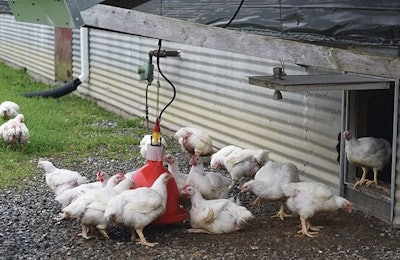
A proposed federal rule that could change the way poultry growers are compensated seems unnecessary, the CEO of Perdue Farms said, because Perdue growers seem happy with the present format, commonly known as the tournament system.
During the Wall Street Journal Global Food Forum on June 26, Perdue Farms CEO Kevin McAdams was asked by session moderator Patrick Thomas about the payment system and the proposed Poultry Grower Payment Systems and Capital Improvement Systems rule, which the present administration has pitched as a way “to address unfairness and deception in broiler grower payments, tournament operations and capital improvement systems.”
“As I think about our farmers’ livelihood, we participate in the tournament system today. That tournament system is very effective. Our farmers and growers tell us that they want to see it stay. That’s what we hear from them,” said McAdams.
 Kevin McAdamsCourtesy Perdue Farms
Kevin McAdamsCourtesy Perdue Farms
“If I listen to the farmer community, and what is on their minds, these regulations that are being proposed by the administration are not on the minds of our growers and farmers. … My own son is a flock advisor at Perdue as well. I hear at the dinner table every day what’s on those farmers’ minds. It is not these regulations that are starting to be thought about through the USDA.”
McAdams said Perdue works with approximately 1,800 family farms for its poultry operations, and nearly 8,000 grain farmers, and their average annual attrition rate is only about 2%.
Related questions
Thomas, a WSJ reporter, told McAdams that one of Perdue’s biggest competitors, Wayne-Sanderson Farms, had done away with the tournament system and asked McAdams about his views on that decision. McAdams told him he wasn’t involved with Wayne-Sanderson’s discussions, so he did not want to comment on that situation.
Thomas also asked if the proposed rule becomes adopted, would it mean additional costs for the integrator and if so, would those costs ultimately be passed on to the consumer.
McAdams said he did not have “enough data points” to be able to accurately answer that question, but he did say, “I think the changes that could occur could lead to a lot of new litigation that is going to put a lot of addition costs in the system that I don’t candidly think need to be there.”



















